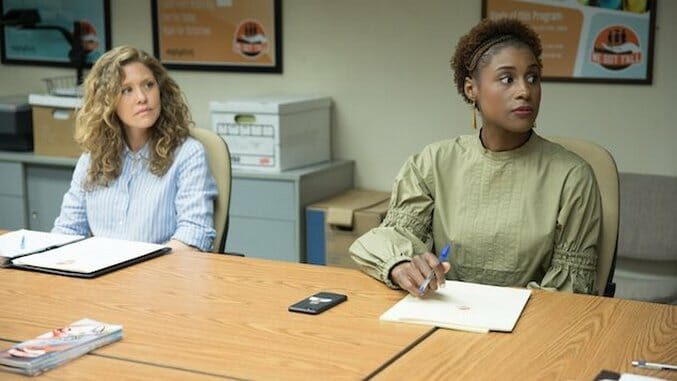Insecure‘s Brutal Humor Will Leave White Saviors “Hella Shook”
(Episode 2.05)
Photo: Justina Mintz/courtesy of HBO
I’m filling Hari Ziyad and Shannon M. Houston’s impossible-to-fill shoes this week, and though there’s much to cover in “Hella Shook”—Yvonne Orji’s delivery of “That’s French for ‘palace,’ bitch!” deserves an essay of its own—I thought I’d focus on a subject I know well: white people. (I also know about adding new men to the “ho-tation,” but that’s a story for another day.)
Insecure’s white characters, most of whom work at We Got Y’all alongside Issa (Issa Rae), are among its broadest; with the exception of Frieda (Lisa Joyce), none can be said to sound more than a single note. That note is “white savior,” and its ring is brutal: On this subject the series’ humor is at its most blunt, and the flatness of the self-styled do-gooders around the table leaves no room for misinterpretation. In addition to being an incisive modern rom-com, an update of the black sitcom tradition that dates back to Living Single, and one of the funniest portraits of friendship now on TV, Insecure is a pungent satire of a white liberals, and never is that more plain than in “Hella Shook.”
We Got Y’all—the name still cracks me up—is reminiscent of the numerous programs aimed at “inner city” or “underprivileged” youth (read, black and brown students) in which the leadership and the rank-and-file are nonetheless predominantly white, and though I’m tempted to call the organization an exaggeration, I’m not quite convinced that’s correct. When I moved to New Orleans to join Teach for America after graduating from college, my intentions were, I thought, pure, and perhaps they were. In retrospect, though—I’m six years out of teaching, with the exception of a single creative writing class at a local charter high school—there’s something breathtakingly arrogant about a 22-year-old white man from an upper-middle-class family in the Boston suburbs marching into a classroom full of black teenagers from south Louisiana and believing that pure intentions are enough. Insecure’s treatment of white saviors is so lacerating because it’s built on the notion that Issa’s colleagues do, in fact, mean well—that the “current climate” indeed demands more arts education, or that the name “Betsy DeVos” should be pronounced with a guttural, soul-crushing sigh—and that this nonetheless fails to prevent well-meaning white people from bringing their privilege, even their damaging prejudices, to the table.
-

-

-

-

- Curated Home Page Articles By Test Admin October 21, 2025 | 3:10pm
-

- Curated Home Page Articles By Test Admin October 21, 2025 | 2:57pm
- Urls By Test Admin October 21, 2025 | 2:57pm
- Curated Home Page Articles By Test Admin October 21, 2025 | 2:55pm
-

-

-

-

-

-

-

-

-

-

-

-

-

-

-

-

-

-

-

-

-

-

-

-

-

-

-

-

-

-

-




































